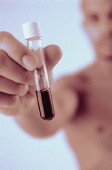
FRIDAY, May 18 (HealthDay News) — Personal genetic testing does not lead to an increased use of health services, a new study finds.
The opportunities for people to undergo genetic tests to learn their degree of risk for developing a disease are increasing, and some experts fear this might lead to overuse of expensive medical care.
The new study, published online May 17 in the journal Genetics in Medicine, looked at 217 healthy people, ages 25 to 40, who participated in testing to determine their genetic susceptibility to certain diseases. The testing was offered by their health plan. The researchers analyzed the use of health care services by these people one year before and one year after their genetic testing.
The health care behavior of the participants in the genetic testing was compared to a group of about 400 people who did not have genetic testing.
The results showed that participants in the genetic testing group did not change their overall use of health care services — such as physician visits and laboratory tests and procedures — compared with those who did not have genetic testing.
“There are a lot of unanswered questions about how genetic test results can be used to guide people towards making positive lifestyle and health behavior changes,” Colleen McBride, chief of the U.S. National Human Genome Research Institute’s Social and Behavioral Research Branch, said in a news release from the U.S. National Institutes of Health.
“This study goes a long way towards bringing data to these debates and shows that people are not likely to make inappropriate demands of health delivery systems if they are properly informed about the limitations of genetic tests,” she added.
The study was funded by the U.S. National Institutes of Health.
More information
The American Academy of Family Physicians has more about genetic testing.

